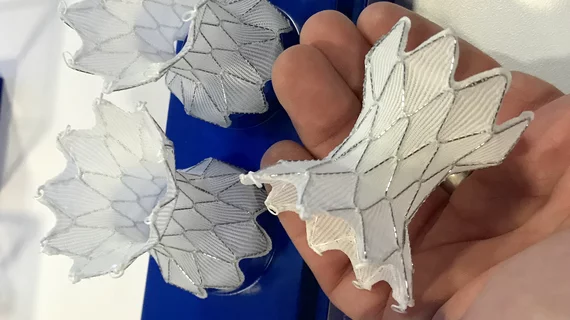Medtronic’s Harmony TPV system linked to ‘encouraging’ 1-year outcomes in new pooled analysis
The Harmony transcatheter pulmonary valve (TPV) is associated with “favorable clinical and hemodynamic outcomes” one year after implantation, according to a new analysis published in JACC: Cardiovascular Interventions.[1]
The Harmony TPV was approved by the U.S. Food and Drug Administration (FDA) in 2021 to treat a leaky native or surgically repaired right ventricular outflow tract (RVOT) in pediatric and adult patients with severe pulmonary regurgitation (PR). Medtronic initiated a voluntary recall in 2022 due to durability issues, but relaunched the device less than one year later.
For this latest study, researchers combined early data used to support that 2021 FDA approval with more recent research to create “the largest cohort to date of Harmony TPV recipients.”
The team explored data from 87 patients who were treated with Harmony TPVs, including 42 who received a device with a 22-mm diameter (TPV22) and 45 who received a device with a 25-mm diameter (TPV25). The TPV22 patients had a median age of 26 years old, and the TPV25 patients had a median age of 29 years old.
Overall, there were no patient deaths after one year. Also, 98% of TPV22 patients and 91% of TPV25 patients were free from the composite outcome of moderate or worse PR, stenosis and reintervention.
Focusing on procedural outcomes, researchers wrote that “successful access, delivery and removal of the delivery system” was seen in 98% of patients. No devices had to be surgically explanted within 24 hours.
The authors did note that non-sustained ventricular tachycardia—defined as 4 or more consecutive heartbeats at a rate of ≥120 beats per minute, lasting less than 30 seconds—was seen in 16% of patients. Fifty percent of those patients were prescribed antiarrhythmic medications at discharge. However, none of them required an implantable cardioverter-defibrillator, pacemaker or anticoagulant prescription.
“Over the past decade, development of novel catheter-based technologies has dramatically altered the management of postoperative RVOT dysfunction in patients with congenital heart disease,” wrote lead author Matthew J. Gillespie, MD, a cardiologist with Children’s Hospital of Philadelphia, and colleagues. “Within the context of this ongoing evolution, the results of this expanded cohort analysis of safety and efficacy of the Harmony TPV are encouraging. Of course, functional durability is one of the central considerations in evaluating this and other novel valve technologies. Accordingly, it will be critical to maintain robust follow-up of these early patients so that we can define explicitly the durability and associated risks that may emerge over time and potentially further refine this technology.”
Medtronic provided funding for this analysis. Also, Gillespie has a working relationship with multiple vendors, including Medtronic.
Read the full study in JACC: Cardiovascular Interventions here.

